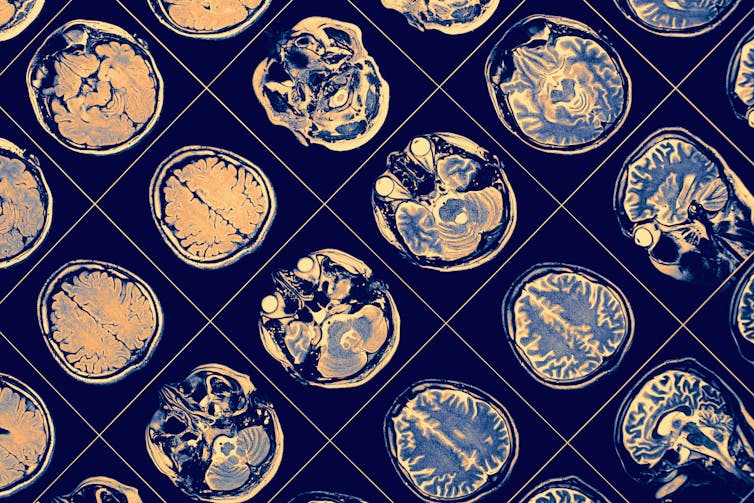By Eleftheria Kodosaki
There’s no doubt sleep is good for the brain. It allows different parts to regenerate and helps memories stabilise. When we don’t get enough sleep, this can increase stress levels and exacerbate mental health issues.
Evidence also supports the notion that the brain gets rid of more toxic waste when we’re asleep than when we’re awake. This process is believed to be crucial in getting rid of potentially harmful things such as amyloid, a protein whose build-up in the brain is linked to Alzheimer’s disease.
However, a recent study in mice has come to the opposite conclusion. Its authors suggest that in mice, brain clearance is actually lower during sleep – and that previous findings could also be re-interpreted in this way.
The brain’s cleaning system
Since the brain is an active tissue – with many metabolic and cellular processes happening at any moment – it produces a lot of waste. This waste is removed by our glymphatic system.
Cerebrospinal fluid is a crucial part of the glymphatic system. This fluid surrounds the brain, acting as a liquid cushion that protects it from damage and provides it nourishment, so the brain can function normally.
During the waste removal process, our cerebrospinal fluid helps transfer old and dirty brain fluid – full of toxins, metabolites and proteins – to outside the brain, and welcomes in new fluid. The waste that has been removed then ends up in the lymphatic system (a part of your immune system), where it’s ultimately eliminated from your body.
The glymphatic system was only discovered in the last decade or so. It was first observed in mice, using dyes injected into their brains to study the movement of fluids there. The existence of the glymphatic system has since been confirmed in humans with the use of MRI scans and contrast dyes.
Based on the results of animal experiments, scientists concluded the glymphatic system is more active at night, during sleep or when under anaesthesia, than during the day. Other studies have shown this waste removal activity may also vary depending on different conditions – such as sleep position, the type of anaesthetic used, and whether or not the subject’s circadian rhythm was interrupted.
Challenging old interpretations
The recent study used male mice to examine how the movement of brain fluid differed when animals were awake, asleep and anaesthetised. The researchers injected dyes into the animals’ brains to track the flow of fluid through the glymphatic system.
In particular, they examined whether an increase in dye indicated a decrease in fluid movement away from an area, rather than an increase in movement to the area as previous studies had suggested. The former would mean lower clearance via the glymphatic system – and hence less waste being removed.

More dye was found in brain areas after three hours and five hours of being asleep or anaesthetised than when awake. This indicated that less dye, and therefore fluid, was being cleared from the brain when the mouse was asleep or anaesthetised.
Although the findings are interesting, there are a number of limitations with the study’s design. As such, this can’t be considered absolute confirmation that the brain doesn’t flush out as much waste during the night than in the day.
Limitations to this study
First, the study was conducted using mice. The results from animal studies don’t always translate to humans, so it’s difficult to say whether the same will be true for us.
The study also only looked at male mice that were kept awake for a few hours before being allowed to sleep. This may have disturbed their natural sleep-wake rhythm, which could have partially influenced the results. Studies have shown that interrupted or bad sleep is linked with an increase in stress levels – which in turn lowers brain fluid flow from the glymphatic system.
In contrast, in the first (2013) study that showed more brain toxins were removed during sleep, the mice were observed during their natural sleep time.
Different methods were also used in this study compared with previous ones – including what types of dye were injected and where. Previous studies also used both male and female mice. These differences in study methods could have influenced the results.
The glymphatic system might also behave differently depending on the brain region – with each producing different types of waste when awake or asleep. This may also explain why this study’s results were different from previous ones.
Virtually no studies looking at the glymphatic system and the effects of sleep in mice have examined the contents of the fluid excreted from the brain. So, even if the amount of fluid flowing out of the brain was lower during sleep or anaesthesia, this fluid could still be removing important waste products in different amounts.
A handful of studies have found disturbances in both glymphatic system function and sleep in people with neurological conditions – including Alzheimer’s disease and Parkinson’s. A study in humans also indicates that more amyloid is found in the brain after even one night of sleep deprivation.
The glymphatic system is important when it comes to how the brain works – but it may very well function differently depending on many factors. We need more research that aims to replicate the latest study’s findings, while also examining the reasons behind its surprising conclusions.




